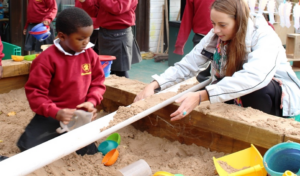Children as leaders: Whose learning is it anyway?
Exploring 21st Century practice
TACTYC presents this special online conference for all those working in early childhood education and care, including practitioners, advisors, EYs leaders, advocates, students and academics. The TACTYC 2022 Conference will focus on ‘Children as knowledge holders and leaders of learning’. Delegates will gain fresh perspectives, critique existing positions and, will be able to create and contribute to dialogues on challenges and opportunities relating to children as leaders of learning in the 21st century

We have two keynote speakers this year:
Professor Federico Farini: Observing migrant children in communication with adults: Shifting the frame of observation from linguistic deficit to display of agency
Federico Farini is Professor of Sociology at the University of Northampton. From 2015 and 2017 he worked as Senior Lecturer in Sociology of Early Childhood at the University of Suffolk leading the equality and inclusion strategy of the institution. Previously in his career, Federico was a founding member of the Centre for Educational Research and Scholarship while at Middlesex University. Federico received a PhD in Sociology of Intercultural Relations from the University of Modena and Reggio Emilia, where he worked as a researcher in Sociology between 2008 and 2013. He has published books, chapters, articles and edited books in Italian, English, Croatian and Slovenian language. His research activity includes large scale EU-funded research projects concerning inclusive education, intercultural communication, renovation of urban spaces. Federico’s current interests mainly revolve around issues of inequality in the access to education and social services, as well as around participatory research methods
Migrant children’s participation in interactions with adults and peers in early years settings can be hindered by their limited knowledge of the host language. Mainstream pedagogical literature suggests that education should prioritise improvement of language competence and positive intercultural relationships for the inclusion of migrant children. However,Professor Frederico Farini argues that the focus on linguistic competence positions migrant children in a condition of deficit, limiting the observation of their participation to linguistic production. If the frame of observation shifts from linguistic competence to communication competence, and if expectations shifts from migrant children’s deficit to the recognition and promotion of their agency, a different image of migrant children emerges. This is an image of migrant children as competent participants in communication, who can produce and act knowledge. The contribution concludes suggesting that a shift in the frame of observation from linguistic deficit to display of agency entails two consequences:
1) approaching linguistic difficulties of migrant children by promoting their participation in communication, recognising their agency as legitimate authors of valid knowledge. This may be an alternative to specialised programs of language learning or promotion of bilingualism;
2) emphasising personal expressions and identities that limit the risk of cultural essentialism, therefore promoting more complex social constructions of migrant children’s identity.
Dr Jane Murray: Young Children’s Agency in Learning: Pictures, Problems and Possibilities for Early Childhood Education and Care
Jane Murray PhD is an Associate Professor at University of Northampton where she co-leads the Centre for Education and Research. Jane teaches, researches, advises and has published widely in the field of education, specialising in early childhood education, pedagogy and social justice. She is qualified as a teacher and head teacher who worked in schools and early childhood settings for two decades before becoming an academic. Jane has worked with government education ministries in countries including Ethiopia, Bhutan, Estonia, Georgia and the UK, and with national and global organisations including The National Gallery and UNICEF. She leads on the Young Children Are Researchers (YCAR) Project. Jane is Editor-in-Chief for the International Journal of Early Years Education and has been a TACTYC member for many years.
Dr Jane Murray proposes that young children’s agency in building knowledge has never been more important than now. She builds her argument by exploring key features of three pillars in early childhood education and care (ECEC) which, she posits, have potential to leverage or hinder children’s ownership of their learning: quality, professionalism and leadership. Jane invites you to join her in (1) picturing these three ECEC pillars (2) identifying some problems embedded within them and (3) exploring possibilities that may support us in empowering young children as agentic learners for life in a world we do not yet know.
The conference will take place online on Saturday 22nd October from 9:30-12:00.
Buy ticket Association for Professional Development in Early Years
Association for Professional Development in Early Years